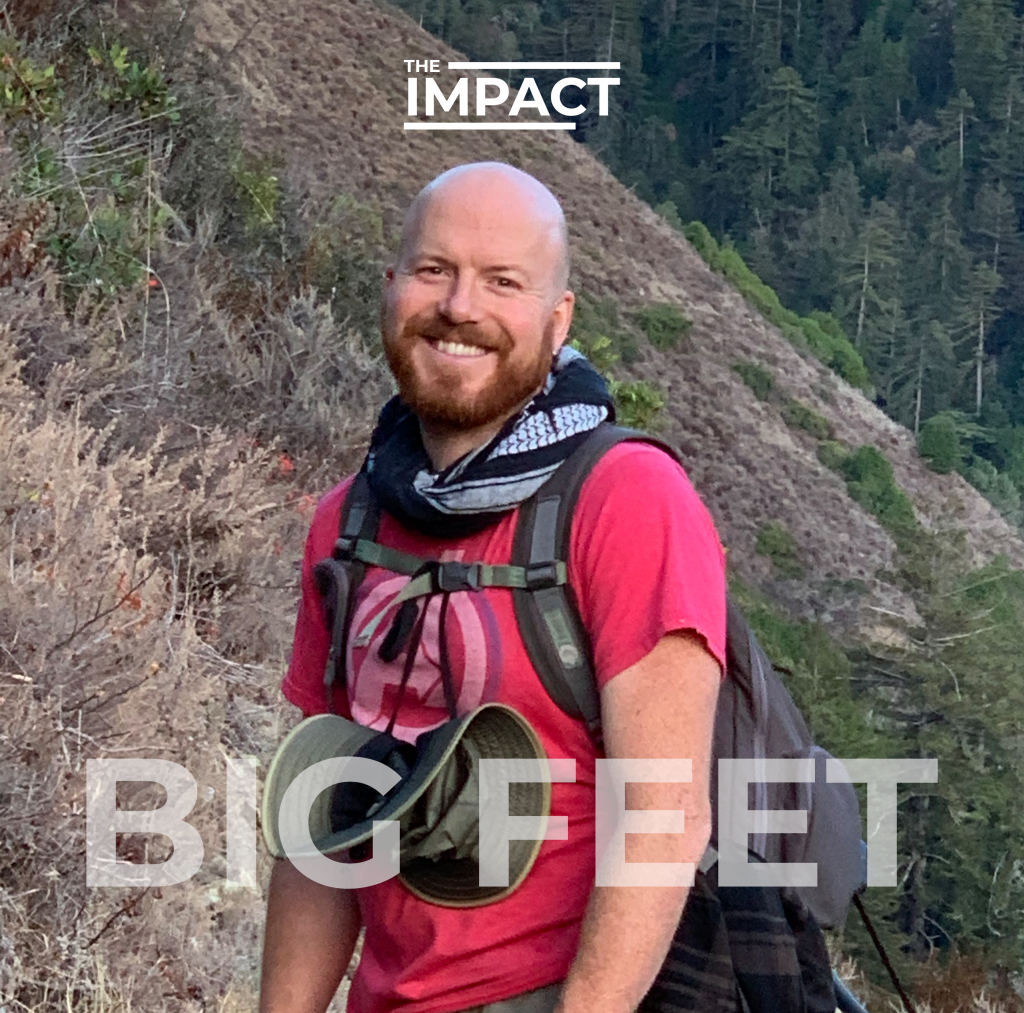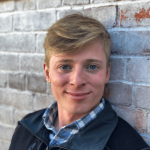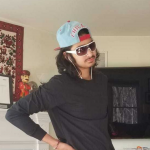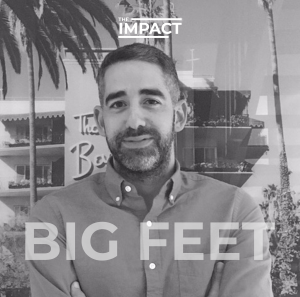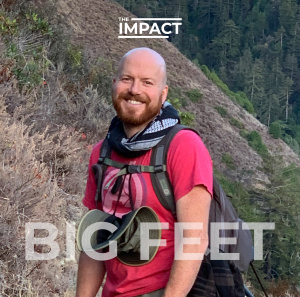Ravi Mikkelsen 0:00
If we get hung up on
all of these, you know, these smaller decisions, we’re not going to be able to move forward on these bigger ones. And that’s really what we need to focus on is moving. These much larger, systemic portions of our society are at primarily our energy and a much bigger like food production system as a whole. move that forward. You know, rather than our small individual purchases, it’s like do the best you can, but focus on this bigger change.
Ian Sumner 0:36
I like that. That’s it. I we haven’t really talked much about the bigger structural change of industry actually kind of with that, but it’s really important.
This week on big feet. We talked about one of these massive systemic industry wide changes, sustainable banking, and what role it plays in our communities.
Ravi Mikkelsen 1:01
My name is Ravi Mikkelsen. I’ve been in the climate fight this climate change space for almost 20 years now since freshman year of college. And I’ve done a ton of different things in that time. And mostly as an engineer, so materials engineering, undergrad, and started off thinking that I would build the technologies to move us off of fossil fuels to cleaner energy future. And then for the last five years, have been focused on developing technologies and business models around capital deployment so that the technologies that other people build can get deployed much more quickly. capital is the Archimedes lever, with climate change. And so I’ve been doing a few different things. I run a network primarily focused in the Bay Area. on climate tech startups are showcasing new technologies connecting them with capital and all the way from individual angels up through hedge fund and private equity government and philanthropic capital, because primatech clean tech as the sector used to be called requires different types of capital at different stages. And then my personal startup, which should be announced soon, is is focusing on deployment capital and drastically reducing the cost of that capital for
for for projects. Yeah. Awesome. And so, yeah,
Ian Sumner 2:55
I think that is a really good point that capitals, what do you call it, the capitals, the Archimedes lover in the climate fight? Can you break that down for me a little bit? Like, I mean, why is it more of a lever in like climate and clean tech and clean energy sort of type of stuff than it is in like, in like fossil fuel? Right? Well,
Ravi Mikkelsen 3:14
yeah. So there’s, I mean, you know, again, it’s, there’s so many different layers, and we can go into the weeds here. But so, you know, and that’s sort of on the project deployment side. And then there’s additional, it’s like, Okay, if you give funding on the innovation side, you know, you might be able to take somebody from having to, you know, work on, you know, some new clean energy technology on nights and weekends to full time and then you don’t you it’s hard to model out innovation. You just don’t know when it’s going to come when that result is going to be where we jump from, you know, 10 to 20% efficiency on solar cells when drilling technology for geothermal. Melissa’s going to, you know, reach this point where it becomes economical. So there’s all these different things and then there’s scaling those technologies up on the fossil fuel side, because it’s a more mature industry, because the scale is so much bigger. The cost of capital there is much lower. Also, because their tax and other subsidies from the government are also 100 plus years old, that they’re basically just the permanently baked into the system, versus the subsidies on the renewable energy side have been, you know, okay, here’s five years, here’s two years, here’s three years, here’s seven years, here’s five years, and that variability causes uncertainty within the market, which leads to higher financing costs. If you can only model out a few years, yourself. Okay, well, here’s the risk if and you look at the, you know, the EIA modeling, and basically being fossil fuels just has this sort of continuous line versus every, you know, every model that the AI does, it goes up and then they say, okay, in, you know, 20 1620, the ITC stops, and so then it becomes flat or decreases. Oh, and now 2020, okay, it goes up and it stops going to and it goes up, stops it, like, all of these little jumps, that they sort of assume, you know, flattened or decrease growth. When those subs he stops and that’s what sort of the market See, and you get that risk sort of post ending of those tax credits because they’ve been so pivotal to the economics of these projects, God and and without that without the certainty and you need some sort of, you know,
the truth in pricing of what something is going to cost or be worth to, you know, adequately model that out, then you say, okay, with our risk adjusted return, we want we you know, we’ll give you a loan at 2% 3% 5%, whatever it is. And now Yeah, you can come back from that. So with fossil fuels, now these, you know, 50 year, plants and pipelines and mines, etc. They’ve had very low cost of capital, but what we’re seeing is as we’re transitioning now, solar and wind have reached a scale globally that it’s the cheapest form of new energy on the planet. And utilities and independent power producers are putting these in just because it’s the cheapest option. It’s the better option. There we go. And so it’s reached a manufacturing and deployment scale where the cost of capital there has, you know, is starting to reach parity in some places, maybe not. But what you’re what we’re seeing, even if it’s not a parody, that the cost of Yeah, there’s the risk cost for fossil fuel plants like coal, all these big banks are saying, we’re not going to fund coal anymore. We’re not going to fund you know, oil drilling in the Arctic desert. Yeah. Yeah, I mean, really, those are like Penny ante steaks, this is not they’re not really coming in yet. Like, okay, all fossil fuels. There’s still a lot of money flowing in. Yeah. If you look at the rainforest Action Network for this last year, you know, for the last two Three years prior if something like $600 billion dollars was
was funded by the big, you know, the big four banks, which is Chase, BoA, Wells Fargo, and City Bank. And now, you know, Chase alone did 65 billion for last year in sort of the extreme fossil fuels which is in this Rainforest Action Network network report. Yeah. And so it’s called banking on climate change and everyone should look at that.
Ian Sumner 8:36
definitely was a peak and I guess it’s it’s tough because it’s it’s I mean, fossil fuel energy. Like you kind of pointed out before we started talking is really deeply ingrained in our daily life. Right. Right. You were you were telling me that you know, before the interview to consider like this the psychology psychology and or, or sec Yeah, psychology. And financial and logistics behind, like, what would it actually take to remove that? And it because it it really is pervasive, it really is everywhere in our lives,
Ravi Mikkelsen 9:10
you know, and focusing on the personal action. So all that previous talk was about these, you know, big projects and large amounts of capital. And I like to focus on what each individual can do. And so I in one of my monthly newsletters in this essay I wrote last fall, and it was about sort of the five biggest steps a person can take, but basically, it’s vote, you know, move your money out of move your move your money out of, you know, basically fossil fuel, you know, funding industries, banks, insurance and investment. It’s, you know, so, you know, to get energy from the sun or other renewable energy sources electrify your home and electrify your transportation, or decarbonize it by biking and walking. So it’s those are the big five things that that we each can do. You know, then if I was going to add a sixth one, I would say, you know, eat more plants. Yeah, um, you know, you don’t have to go 100% vegetarian or vegan, but if you just eat more plants, and slightly less meat, that’s a great thing. Yeah. You know, I’m personally vegetarian, but that’s not where I focus, you know, my education and activism on.
Ian Sumner 10:40
Yeah. And so I also wanted to like, talking about so you do so with climate link? You do a lot of what you call it. community building activism, what sort of space would you describe that in?
Ravi Mikkelsen 10:56
Yeah, I am. I’d say it’s more community based. In education and activism, with climate link, I mean, it’s a it’s a meetup and a network. And we, you know, it’s a lot of welcoming and introduction. So there are folks like myself, who’ve been it for a very long time sworn have there a touch light, who’s, you know, built products and has been working on this for a while, but then there are people who come from other tech companies that are, you know, consumer focused and like, I’ve been working on ads or social media or photography and all these other things, and I want to do something to directly, you know, have a positive impact on the planet on our environment. What can I do? And so they’ll come to one of our meetups and they’ll hear a talk on, you know, software for grid controls or creating robots that can, you know, help reduce pests without chemicals. agricultural fields are controlled water, so we’re not wasting water. Yeah.
Ian Sumner 12:04
So that being sort of your goal, I mean, so how would you, I guess, how do you describe the importance of community in fighting climate change and transitioning off of fossil fuels? Like, well, like, what role does that play? In this?
Ravi Mikkelsen 12:25
Yeah, there’s a few.
There’s a few ways.
One, like we live in communities, and we need to support each other. And this is not about saving penguins, but about, you know, saving us, it’s the habitability of our planet. And there will be bands that are always you know, temporary and good and all this. But as our climate zones shift, we’re gonna you know, people are going to be disproportionately affected will have migration will have great conflict. So it’s about, you know, preserving our way of life on this planet and the livability of this planet for us. And so we need to remember that and we need to, you know, help each other out in our families out. And so there’s that aspect of it, it is, you know, the community is like this local and global community that we need to take care of. And the other is about, you know, education and sort of social proof things like, okay, they’ve shown that if, if there’s one solar system, you know, once the first solar system goes into a neighborhood, then that is likely to, you know, be copied sort of within, you know, a couple of times over within like a half mile radius, people see it, it becomes normalized. Yeah.
Ian Sumner 13:56
So they’re like, they get a Tesla and everyone is curious about it and trying it out and test driving and everything right. Same thing was told, yeah, that’s interesting. And I guess the same thing with solar panels.
Ravi Mikkelsen 13:59
Same with the, you know, so like when I got a diesel vehicle in college and started, you know, putting biodiesel in it and talking to people about it, um, I constantly heard, it’s like, you know, I never saw diesel vehicles on the road, but now I see them everywhere. And it’s like, when I got a Nissan LEAF, the first one in 2011. You know, it’s like, v one. You’re like, Oh, now I see them everywhere. And that’s, oh,
Ian Sumner 14:35
here’s this EV and you really do see those ones? They’re very distinctive on the road. Yeah,
Ravi Mikkelsen 14:40
exactly. But it’s, you know, once it enters our consciousness, then we can start seeing it more that we recognize it. And, and so there’s that part of it, and then, you know, educating each other helping each other out this collective action. So there’s a You know, there’s a movement called stop the money pipeline. And it’s about getting people to move their money out of, you know, Chase Bank. And we want to, yeah, like Tesla has done, they’ve all accelerated, you know, their own development of ease. And so there is this movement to shift capital out of the big banks, you know, we move our deposits out of the big banks, you know, and we focus on deploying that capital towards these renewable energy projects. And if you can’t tell this is what I’m working on. And, you know, so we will be, you know, giving a place for people to move their deposits to hopefully soon. And once that happens, it’s like, we get enough of that capital moved out. We’ll get these big banks to you know, reach that end state which we will Which is then to say, okay, we’re not going to find any fossil fuels anymore. We’re going to, you know, only focus on this transition. You know, metallurgical coal is going to be very difficult process eat, there’s a lot of challenges, electric vehicles, you know, easy rooftop solar easy, but there’s a lot of difficult things in there too. And we have to figure that out. And we’re doing that as we go. Yeah. And we have to take again, community, like, there are still, you know, millions of people that work in the fossil fuel industry and around the world. There are people that go into mines, and, you know, they dig up cool. And that’s how they take care of their family. And that’s how, you know, we’ve gotten to where we are, is the progress that has been made has been on the fossil fuel economy, and we need to take care of the people that still work in that industry and get them to transition. As you know, oil has declined And, you know, people have been worked on oil rigs and drilling have lost their jobs. Well, geothermal has, you know, risen in its potential. And so they’re, you know, geothermal companies are hiring oil workers, offshore wind companies, and the same people who built an installed offshore oil platforms are going to be the same people who are the experts, I’m going to lead on offshore wind platform development.
And so this, you know, let’s bring them in.
Ian Sumner 17:40
Yeah. And I guess so you see the beginning of this transition. It starts with, I guess, people moving their capital choosing and pressuring banks and financial institutions to not
make these investments, In the fossil fuel industry.
Ravi Mikkelsen 18:02
exactly, and there will be so on the banking side on the insurance side on the investing side. So the in 2006, the UN launched the principles for responsible investing. Since then, you know, it’s essentially gone from maybe a few hundred million or billion at that time to a $50 trillion asset under management industry globally. And this past year, they launched the principles for Responsible banking. And so now banks, and there were, you know, 131 signatories of these global banks representing roughly one third of the total assets, which I believe was $47 trillion represented. And, you know, it’s all about ESG environmental, social and governance how to be more transparent How do we you know, so some of those banks are now including a sort of climate or carbon price in their loans. Like, we’re talking, okay, very slow ramp up, but like this is happening. And there are laggards and they’re going to lose out. But so they’re, you know, so on the banking side, and we’re also going to see more competitors there, you know, if you work in climate tech, but you own you know, an s&p index, you know, shares in an s&p index fund, you are, you know, owning and funding fossil fuels there. And so, we need to solve that.
Ian Sumner 19:44
So if I like don’t want my money going to fossil fuels, right, I, you know, yeah, a little bit of money in the bank, right. I’m not doing any big huge stock investments or anything, and especially not now but um, Like, if if I don’t want any sort of piece of my money going towards these things, what can I do right now to prevent that?
Ravi Mikkelsen 20:09
So like the, what’s available right now is primarily your local banks and credit unions, which fund things within the local community. That’s where, you know, community comes in once again. So if you go to one of these local community banks or credit unions, your money will likely not go to fossil fuels other than help perhaps, you know, providing a loan for somebody to buy a car, which is likely to be an internal combustion engine vehicle right now.
Ian Sumner 20:42
But at least if they’re buying a new car, hopefully more efficient than they used to have. Exactly. Or maybe it’s actually an electric car suit. Okay. Okay, good.
Ravi Mikkelsen 20:49
Yeah. So there’s so there’s that local credit unions,
Ian Sumner 20:53
and banks, okay. There’s a
Ravi Mikkelsen 20:55
couple of
you know, all Neo bank or alternative non banking startups? I mean, they’re specifically the Clean Energy credit union based out of Boulder. And,
you know, so our startup,
you know, will hopefully be providing a solution here. And we’re going to, you know, we’re going to need several solutions here. And the thing is, it’s like, it’s not easy yet. Yeah. And that’s, you know, that’s what we want to do is make it easy for people. Yeah. But, so right now, I’d say, you know, go to your local bank or credit union, and also, you know, follow along. And hopefully, we’ll be provided, you know, like, drop me a note. Sign up, and we’ll let you know when we can, you know, provide you with a fossil fossil fuel free banking solution.
Ian Sumner 21:57
Yeah, once you get that up and running, I think we Great to have you on to get more into the weeds with thinking Sure thing.
Ravi Mikkelsen 22:03
Yeah, we’ll do it. We’ll do a follow up.
Ian Sumner 22:05
Yeah. Where are we right now? And what do we need to see as far as community action? And and to get from where we are now to where we want to be, which is I guess Climate Neutral, right and not having a climate crisis.
Ravi Mikkelsen 22:20
Yeah, or regenerative? Like, yeah. Instead of just neutral, let’s let’s make it cyclical, whatever. Make us yeah, I mean, so let’s, you know, make it as one I heard one person say that, you know, the, the health of the planet and their vulnerability, it’s like, gets better by our presence here on the planet. And, and what we need, you really it comes down to in the US probably, you know, I can said sort of these these top five choices, the top five personal actions that people can take that will lead to systemic change. And that’s what we need the personal actions of refusing, you know, plastic or something like that or a straw, while grade is not going to do a ton, it’s not going to do a lot. But if, you know, we make sure that everyone gets out and votes, and not only that we understand the issues and we vote for, you know, local, state and federal represent, you know, our leadership that continue to move us in that direction. Yeah, right now, like with this recovery bill, that’s that’s gone through with the money that the federal government is going to be spending with the state governments that are going to be spending, let’s make sure let’s speak with our leadership to make sure that that money goes towards, you know, projects that move us in this, you know, future direction, we want these technologies that you are beneficial to our future? And are not just propping up the past. Hmm.
Ian Sumner 24:06
Yeah, so I guess I guess the the the root of it kind of right is to get people to start making these calculations and just to start thinking about their actions and their impact of that. And I mean, just bringing it back to where we were kind of earlier as well, like you were saying, you know, one person gets solar on their roof, and, or someone gets a Tesla, and all the neighbors and everyone else, you know, in their network kind of sees and looks over at that, and it starts to kind of spread so by, I guess, taking that a step further, right. It’s, you know, starting to do these calculations and starting to ride to work instead of this are starting to bike and drive like that. Just our actions and being involved in our community can lead to compound that and make and inspire more people to do it right is kind of I guess what you’re getting at that right? Would you say?
Ravi Mikkelsen 24:56
Exactly, and, you know, some of these complicated calculations are complex, and I don’t expect everyone to, you know, become energy or financial experts. But if you understand the crux and then you come to resources, you know, like, like me, like my startup like your startup we’re building. Yeah, the trusted advisors for people. And we say, Okay, here’s how, you know, here’s how you walk through this calculation. Here’s here are the things to know. And, you know, we can meet people where they are, rather than say, Oh, you should do as I did, because I’m holier than now. But we say, like, what are your goals? It’s like, okay, maybe I can bike, you know, one day a week. Oh, I have to drop my kid off at school. And then rather than go all the way home and get my bike and do this and take an extra hour, I’m going to just, you know, just drive the extra two minutes. You know, do that. a two minute drive from kids school to the parking lot next to the public transportation and then do that. And so it’s, let’s all do the best that we can, where we are with what we have. Yeah. And that’s, that’s, that’s what’s going to create this better future for all of us, not just a few of us, you know, being absolutely perfect. And then everybody else being stopped because we have this, you know, gateway, or if you’re not doing 100% you’re not allowed in. It’s like, well, it’s like, well, you know, let’s say somebody is, you know, they physically can’t bike to work, or walk. It’s like, Well, okay, let’s, what’s the best for them now, like, it took me you know, I was I was hit by a car in 2010. And it took me many years to be able to, like, physically and psychologically get back on a bicycle like And so I had to overcome those things to ride again. And still, I’m super cautious. So it’s it is I feel it is a privilege to be able to bike to work. And I want to protect that. And I I want to, you know, be cognizant of not everyone can now I want to help them to do the best that they can, where they are with what they have. Nice,
Ian Sumner 27:29
Ravi, thank you so much for coming on. And good luck on the startup, the rainforest Action Network report thinking on climate change. I’ll put that link in the description.
Ravi Mikkelsen 27:38
Yes, I’ll tell you that. And then also a link for our newsletter. Yes. Also bit.ly/climatelinknews. Pretty easy.
Ian Sumner 27:49
Awesome. Yeah. Well, both of those will be in the show notes. And thank you so much for talking.
Ravi Mikkelsen 27:55
Yeah. Oh, great. Now, and thank you so much for this opportunity. Everyone, do the best you can. Let’s make every day better and take care of yourself and your family right now. This is an important time.
Ian Sumner 28:14
Big Feet is the production of the impact and produced by me, Ian Sumner music is made by Swaroop Pujari. Check out our publication along with our other podcasts at readtheimpact.com. We’ll be back next week.
Interesting Links Mentioned during the show:
ClimateLink Newsletter: https://bit.ly/climatelinknews
ClimateLink Meetup: https://www.meetup.com/ClimateLink-NewYork/
Rainforest Action Network: https://www.ran.org/

